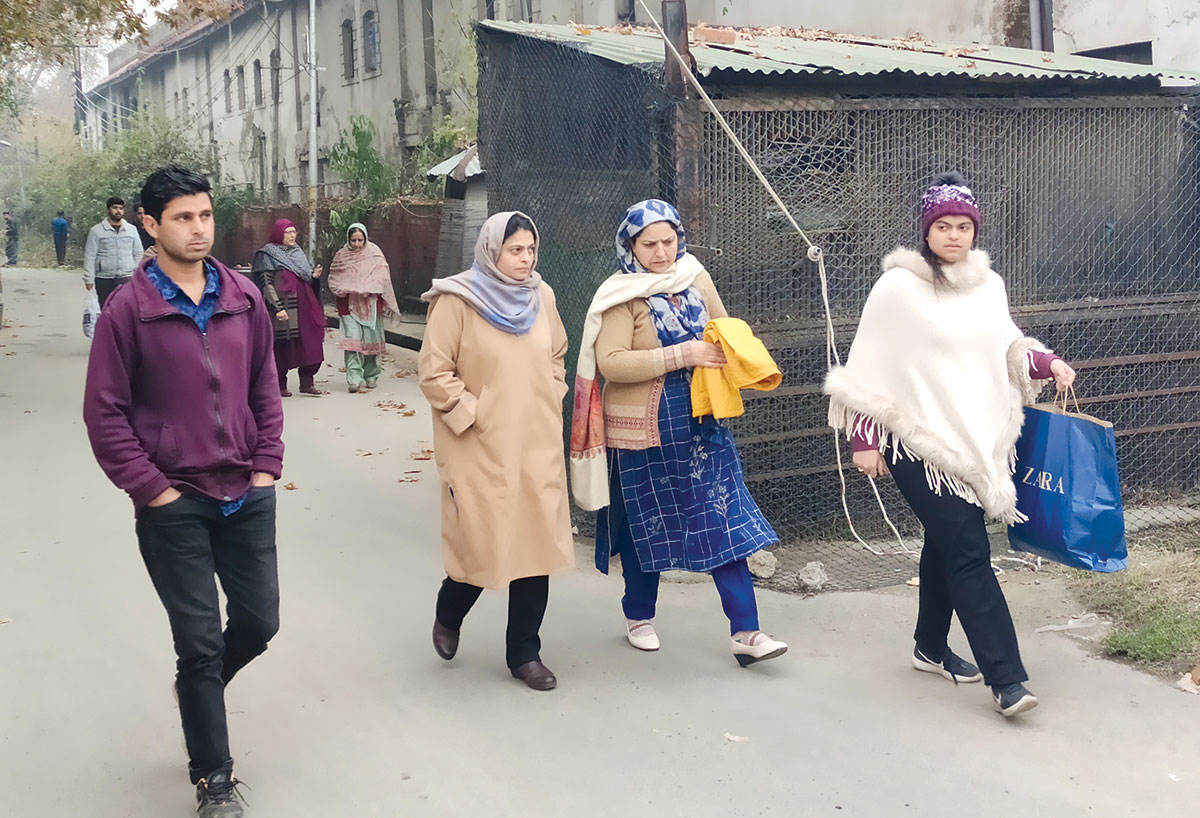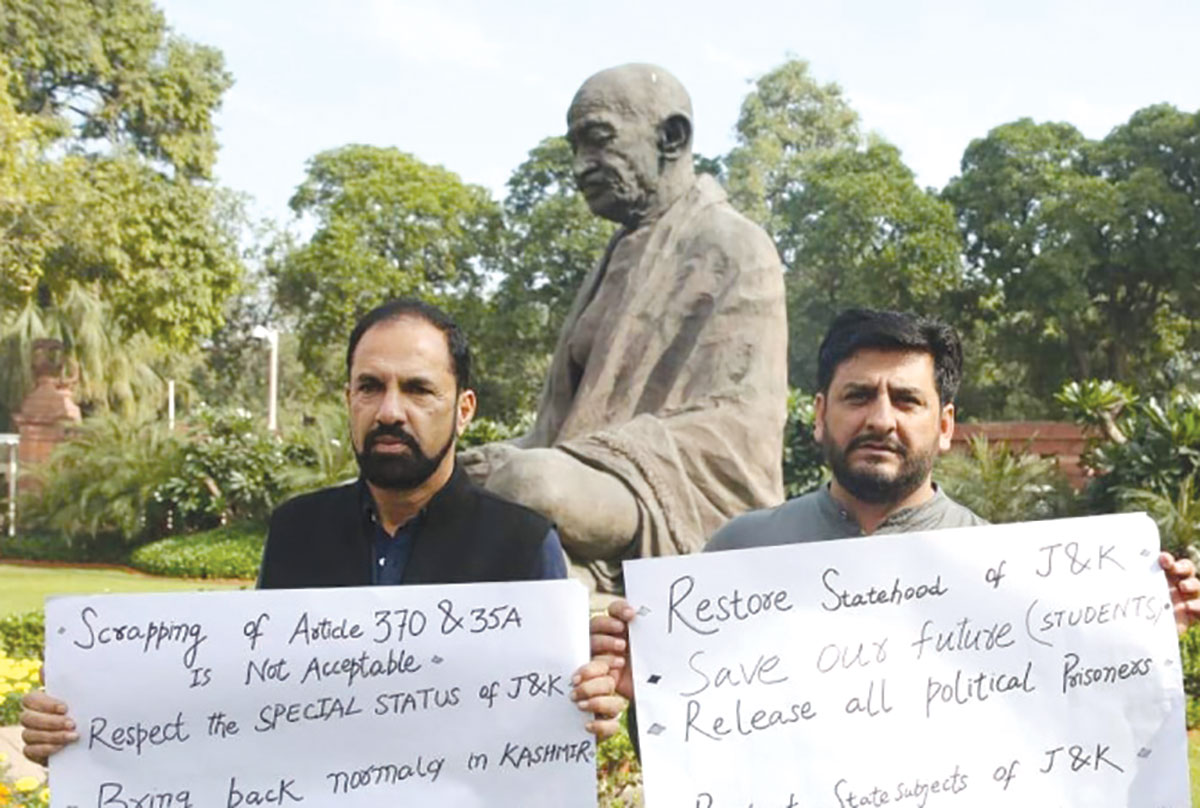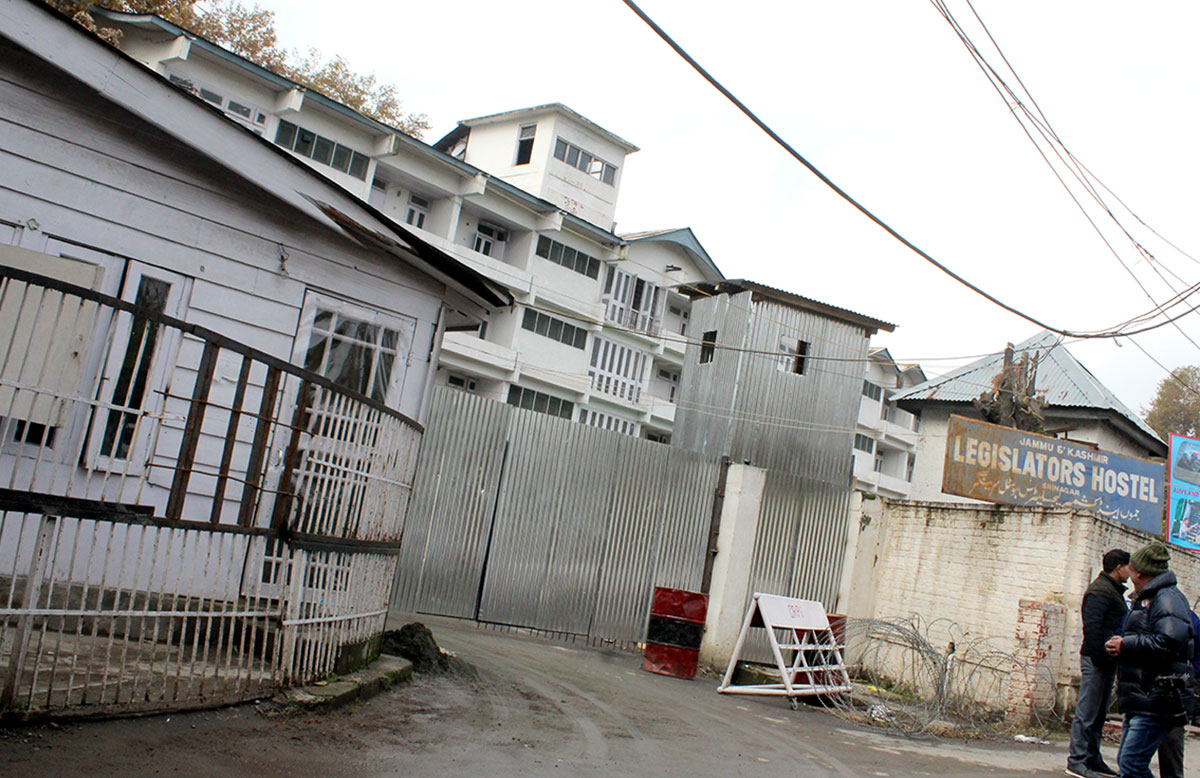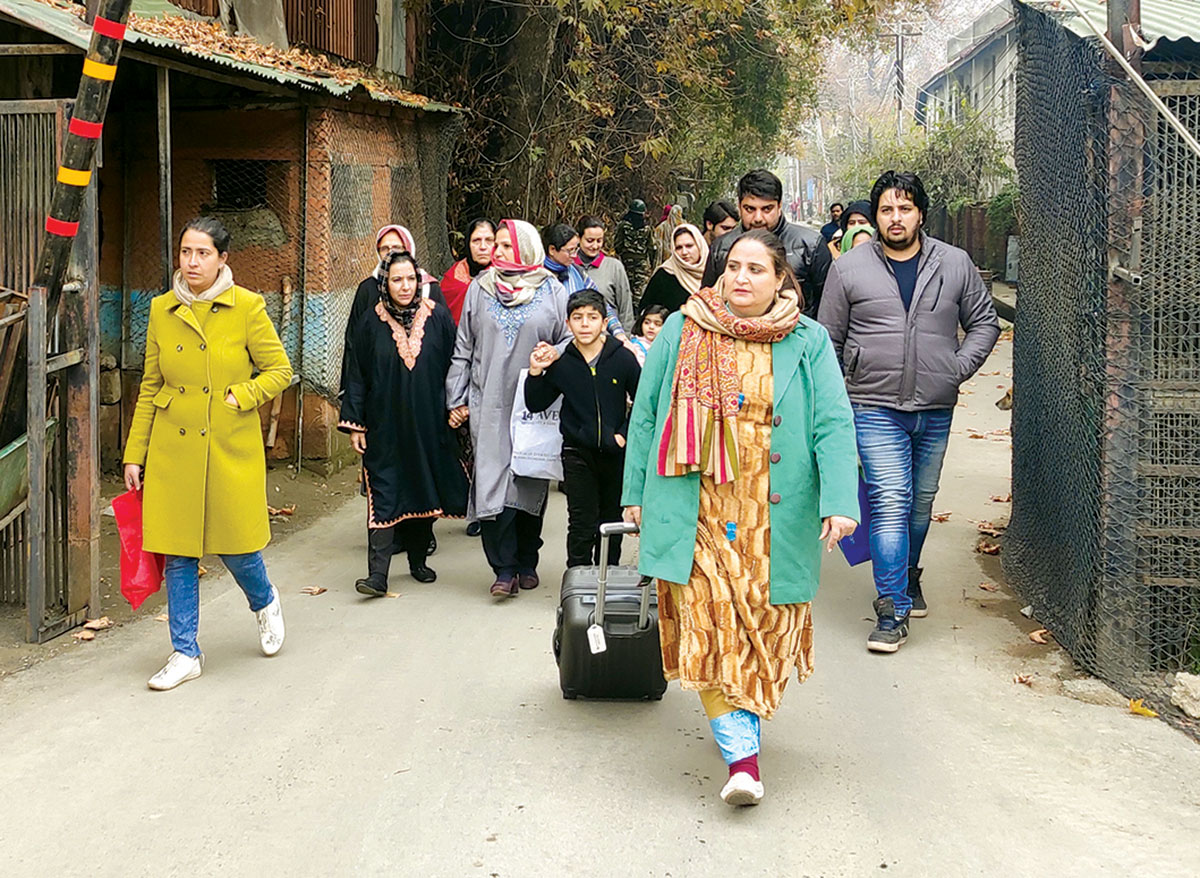As the UT administration shifted the detained political class from a Boulevard Hotel to the Lawmakers’ Hostel, apparently for the winters, their families were seen taking the basic life requirements into the dilapidated building to ease their incarceration. The emergence of the sub-jail in the heart of the city, however, marks a new chapter in the history of the lawmakers’ lodge that has played host to the return of democracy at the peak of militancy, reports Masood Hussain

On November 18, when the bicameral parliament resumed for the winter sessions, it started with Kashmir. In the Rajya Sabha, Mir Fayaz and Nazir Ahmed Laway, both from PDP (although Laway has already lost the party membership), were seen in front of Sardar Patel’s statue carrying placards against the abrogation of Article 370.
Where Is Farooq?
The drama unfolded in the Lok Sabha where the opposition sought the presence of Dr Farooq Abdullah, Kashmir’s five-time Chief Minister, who presently represents the central Kashmir Srinagar constituency in the parliament. The protest by Congress, National Conference, Nationalist Congress Party, Revolutionary Socialist Party and Dravida Munetra Kazhgam (DMK), Trinamol Congress and other parties started as Speaker Om Birla invited Telugu Desam Party’s Kesineni Srinivas to pose session’s first question. Trinamool Congress had sought adjournment of the House over Farooq’s detention. Eventually, they all got into the well of the House. Amid pandemonium, however, proceedings continued.
On August 6, a day after he announced the undoing of special status and literal abrogation of Article 370 and re-organised Jammu and Kashmir into two UTs, Home Minister Amit Shah had talked about Dr Abdullah’s status. “He is not under house arrest; he is not under detention. He is in good health, mauj-masti mein hain, aap zara baat kar lo (He is having a good time, you talk to him),” Shah told the Rajya Sabha, hours before its sine die. Pointing his right index finger behind his ear, he asserted: “I am saying on record that he is not under arrest. Unko nahi ana hai toh gun kanpatti par rakh kar bahar nahi la sakte hum (If he doesn’t want to come, we can’t force him out at gunpoint).”
More than 100 days later, the opposition was seeking an explanation for his absence from the House. “But Farooq Abdullah is still in custody… What injustice is this?” Adhir Chowdhury, who leads Congress in the House, said. He said the situation in Kashmir was akin to a doctor declaring that an operation was successful even though the patient had died. He regretted that MPs were denied access to Kashmir and “bhade ke tatu (hirelings from Europe)” were permitted. (Speaker said he will examine if the word needs to be expunged.)

“Farooq sahab represents Srinagar and it is right of the two million people of Srinagar that their voice be heard in the House,” NC’s Justice (retired) Husnain Masoodi addressed the Speaker. “I have proof that he is not in judicial custody, he is in preventive custody. Your one order can revoke it.” Added DMK leader TR Baalu: “What has happened with Farooq is illegal…You are custodian of the House…You have to make intervention.”
In Shah’s absence, it was Speaker who responded: “It was true at that point of time. He was formally detained under the public safety law on a later date.” His detention under PSA came hours before the Supreme Court was to hear a habeas corpus petition filed by MDMK leader Vaiko. Referring to the statute book, the Speaker, however, said: “Till I don’t get this information (from authorities formally), this house does not treat it as an arrest.”
Dr Abdullah is one of the three former Chief Ministers currently in detention. Omar, his son, continues to be retained in the erstwhile Palace and Mehbooba Mufti, who was restricted to a hut over the Zabarwan Hills, not far away from the Raj Bhawan, was shifted to a government house on November 14, a bungalow where she lived for three years when her father emerged the first non-Abdullah Chief Minister in decades.
Dr Abdullah continues to be restricted to his home on Gupkar Road, Kashmir’s erstwhile power street, the residents of which were recently on road protesting resumption of power supply. Interestingly, the 81 year old, having “tremendous potential to create public disorder”, was included in a 21-member consultative committee on defence by the Lok Sabha.
Dramatic Shift
The actual drama that happened on the political detainees’ front took place on the eve of session’s start. On November 17 afternoon, 33 high profile political activists including former ministers and lawmakers were shifted from the Centaur Lakeview Hotel to the MLA Hostel, a twin building structure that was “home” to some of them for years. The shift, apparently dictated by the weather conditions, moved to front pages for multiple reasons.
The first part of the drama took place when the authorities started moving the first batch of 12 detainees out of the hotel. “The employees of the hotel prevented the administration from shifting the detainees and demanded payment of Rs 3.5 crore,” reported The Daily Excelsior, a Jammu based newspaper. After hiring 42 rooms including 13 rooms for the security of the sub-jail, the newspaper said the authorities had neither paid the rent nor the costs of the food. “The standoff lasted for around an hour and police and security officials present there failed to break the impasse. Finally, the administration sent Magistrate, Naeem Khan, to handle the situation. He assured the hotel administration that Government will clear the bills. Khan later signed the bills after the Deputy Commissioner Srinagar also spoke to the hotel administration assuring them that he will clear the hotel bills.”
The second part of the drama unfolded at the main gate of the MLA Hostel that emerged as the newly designated sub-jail in the heart of the city. It started with the frisking of Sajad Lone, who shouted: “Why don’t they trust us? We are not thieves.” He protested and many others from NC and PDP joined him. There was a verbal spat. Later, the young men refused to get into the hostel and symbolically protested in the premises till Ali Mohammad Sagar and Naeem Akhter intervened. “It does not look nice. They have their own duty,” the duo was quoted saying the protesting politicians. “Please shift to your rooms.”
Mehbooba’s daughter, Iltija, issued series of tweets on the incident that police said had not taken place at all. “If a man whom PM Modi called his younger brother (a reference to Sajad) is being humiliated like this, imagine the plight of others,” she said in one of the series of tweets, alleging Sajad was asked to undress during frisking. “The same Waheed Para whose work for strengthening democracy in J&K was lauded by former Home Minister Shri Rajnath Singh. The very same Shah Faesal who was called Kashmir’s role model when he topped UPSC exam. Once appreciated & now humiliated. Why?”
Authorities had made certain change in the hostel building to suit the sub-jail requirements. The windows were blocked, and in order to prevent the inmates from talking to the outside world, cell phone jammers were installed, according to Iltija. The hostel was housing the municipal corporators and the authorities have partitioned it, converting part of it into the jail. As many as 33 rooms house the detainees and the five for the security detailed led by a DySP, according to Daily Excelsior.
Crowd Visiting
Families of these politicians were denied a meeting with them for the initial three weeks in August. Later, they were given a day in a week, which was extended to two days later. Post-shift, November 21 was the first day when the families met them. Their three-hour-long meetings actually created the main news of that day.
Some of them had carried basic items in their cars but were prevented from driving in. These detainees are supposed to organise their own toiletries. “We are carrying certain items that these leaders need as there are no facilities,” Sartaj Madni’s son Saqib told The Telegraph. “How will we shift these items like matting and heating appliances which we have to get ourselves?”
Their kins told reporters that they were considering seeking judicial intervention but were prevented by the instance of Dr Farooq Abdullah. “He was booked under the Public Safety Act immediately after his case went to the court,” daughter of one of the politicians said.
They alleged that the Hostel is being subjected to frequent electricity cuts despite the cold weather. The cell phone jammer is generating “annoying noise”. They have access to an electric blanket and a single rod standing room heater.

Naeem Akhter’s daughter Shehriyar Khanum, who has termed the arrest of political workers as Modi government’s “political demonetisation”, was the most vocal in telling the inside tales of Srinagar’s new jail. She told TVNews18 that the visiting women were subjected to frisking, were asked “to remove clothes” and “socks and headscarves.”
“The place is not liveable even for hardcore criminals. The authorities are trying to put regional leadership on par with criminals — it reeks of political vendetta. The place is simply unhygienic and lacks basic facilities. My ailing father’s health will only deteriorate in case such pathetic services are offered to him,” Khanam was quoted by The Hindu saying. “Rooms are in such unhygienic conditions that there is no suitable place to offer prayers. The common washroom is unbearably stinky and untidy. It seems they are being subjected to inhuman conditions.”
Bloodied Memories
For some of the 33 detainees, like Ali Mohammad Sagar, who is being held in the lawmakers’ hostel with his son Salman, it is sort of the home coming. They have spent prolonged periods in this hostel at the peak of militancy, especially in anticipation to the 1996 assembly elections that brought Dr Farooq Abdullah back to power. The hostel, in a way, represents the recent history of the return of democracy.
Journalist Ahmad Ali Fayaz, along with few other reporters, was one of the few inmates of the hostel after it was left deserted by militancy, when the political class accompanied Kashmi Pandits to Jammu. He started living in the hostel in 1993 summer. “In two blocks of the hostel, there were hardly 10 rooms occupied,” Fayaz said. “Some people, mostly politicians, had retained their rooms allotted and locked but were not living there.”
It started getting newer inmates only after 1994. NC’s Bashir A Nengroo was perhaps the first political worker who started living in the hostel. This came after his family had a series of bloody attacks at their residence. He was later joined by Ali Mohammad Sagar, Choudhary Mohammad Ramzam, Sadiq Ali who returned from Jammu. It was fairly crowded in late 1995 as the Lok Sabha polls took place. In fact, Dr Farooq Abdullah announced the first list of his party nominees to the 1996 assembly elections from the dining hall of the hostel, Fayaz, who attended the news conference, remembers.
“We had a neighbour, an old man, called Ghulam Rasool Sheikh, a former member of the state legislative council. He was also living in the hostel,” Fayaz said. “One day, I saw him collecting his belongings. I enquired and he said that he will go home as he has managed peace with militants. A few days later, when we were busy with Ramzan preparations, we heard he was assassinated in Bhishamber Nagar where he had gone to see his sister.”
That was not the only incident of violence linked with the hostel. By the fall of 1996, an elected government was in place and the assembly was in session. On October 23, Fayaz had a providential escape. “I was readying for the assembly and was actually late by a few minutes. I was leaving and there was a deafening bang,” Fayaz remembers. “I rushed out; it was a car- bomb blast on the main gate.”
Police sources said they have investigated the attack (FIR 157 of 1996 with PS Kothibagh) in which two security personnel were killed.
The worst, however, came a year later. “I was out on work when I heard of the blast in the hostel,” Fayaz said about the June 29, 1997 explosion. “I rushed home with Shujaat, another journalist and a visiting academic and saw the shirt of the neighbour on top of the Chinar tree.”
In the hostel, post-1996 came a former militant, who had joined the Panthers Party. Locally, he was known as Ramba Katchur. His actual name was Mohammad Ramzan Hangi (or Bangi), who lived somewhere in the Anchar belt. It was later known that somebody had come to his room with a TV set and kept it with them saying that the TV was for somebody but they were free to watch it if they wanted to. As Ramzan came, he switched it on and with that, a powerful IED went off. The TV was carrying an IED. Those injured were Ramzan, his two brothers-in-law and his wife. Only his wife survived with serious injuries and had to undergo a series of surgeries.
Police said the records (FIR 80 of 1997 with PS Kothibagh) have details of three deaths including two civilians. No challan has been submitted because the case was untraced.
“That was horrific,” Fayaz said. “I seriously started working to have alternate accommodation. I left the hostel within days after that attack.”
As situation improved, the hostel became a hub of political activity. In the subsequent years, however, the lawmakers – especially from the ruling parties – managed better accommodation, and the hostel would house their aides. During the notorious sleaze racket of 2006, CBI arrested an accused from the hostel room allotted to a lawmaker. At the peak of 2014 floods, an MLA was accused of retaining flood relief in three rooms for his constituency, which was not impacted by the floods. In September 2015, during BJPDP regime, Engineer Rasheed made the hostel famous by purchasing pre-cooked mutton kebabs and announced it was a beef party!
After the governor’s administration evicted the former lawmakers from the hostel in the 2018 fall, it accommodated the new flock of “politicians” who “won” in the trickiest municipal polls in Satya Pal Malik’s governorship. Now they are in one part of the hotel as the other is a designated jail.
Killing Time
Rasheed, who is in the custody of the National Investigation Agency (NIA) since August 4, lived there for some time. He once spoke at length in the state assembly about the dire requirement of repairing the MLA Hostel. His speech was recorded and the routine assurance by the government put an end to the issue. Many years later, as some of these policymakers are being retained as the detainees in the same dilapidated building, it is too early to know how they are managing their cold nights in the hostel.
However, it is now public how these men spent more than last 100 days in the hotel.
“The mood inside was one of anger, being let down by Delhi, of being back-stabbed. They could not believe what had happened, and how the government could have done what they did without discussing with them, without Farooq Abdullah, without veteran politicians like that,” Dr Raja Muzaffar Bhat, the RTI activist who flirted briefly with politics, told
Nirupama Subramanian of The Indian Express. Incidentally, when he was being shifted to Centaur Lake View Hotel from Budgam, the bulletproof carrier was caught in intense stone pelting. “We shared the books (brought by families of Lone and Shah Feasal). Apart from watching TV, we played cards sometimes.”

The food was initially non-vegetarian but possibly the costs paved way for the vegetarian routine in the 5-star jail. They felt the irregularly supplied newspapers lacked news and views.
The state of inmates pained Bhat a lot. “I could not understand why I had been detained; I felt more sorry (sic) for my fellow prisoners. They were the ones who had raised the Indian flag in Kashmir, risked their lives by being on Delhi’s side, and yet this was their situation,” Bhat has said. One of his inmates was a politician who “would never miss a single salaami parade” on August 15 or January 26. “He told me he could miss a namaaz but not these functions. His father and brother were killed by militants. A grenade was thrown into his home. For him, his detention was totally beyond comprehension.”
Bhat shared his worst fears with Nirupama. Father of a son, 8, and a daughter, 11, Bhat said he and his wife had deliberately avoided discussing politics, protests or the violence in front of their kids. “We wanted to give them a secure environment,” he was quoted saying. “Now, Kashmir’s entire history book has been opened before them by the State. A new generation has learnt about things they never knew.”
Confused Signals
As over 110 days crisis is getting into the new generation, the government is seemingly in confusion. People in power are talking in different languages. G Kishan Reddy, the Home Minister junior, discovered the emergency of 1975 to defend the continued incarceration.
“In the country’s interest, different people were arrested at different time… During Emergency, you arrested 36 MPs to save one person’s chair …,” Reddy told the Rajya Sabha, alluding to Indira Gandhi’s emergency. “We are working in the interest of the nation and its law and order.”
In Jammu, Dr Jitendra Singh Rana addressed a conference. “If the situation is peaceful because they are detained, then it is better that they remain detained,” Singh was quoted saying.
Ram Madhav, BJP’s senior leader, who had handled Kashmir, told at Observer Research Foundation (ORF) seminar that “sooner than later” political engagement must begin with Jammu and Kashmir as Delhi was not nurturing a new “political class”. He did not rule out the possibility of political activity by Omar or by Mehbooba. “I am sure they will definitely have a role to play in state politics,” Madhav was quoted saying. “Once they have the opportunity to come back and restore their political activity.”
“Let me clarify on the question of new political class being nurtured or cultivated from Delhi. No such thing is happening from our side. We have huge respect for all the leaders of different political parties in the valley. I said it earlier, that (at) the earliest possible opportunity, they will resume their political activity,” the Press Trust of India quoted him saying. He, however, said BJP favours the emergence of new leaders from the grassroots level. The political space will be opened up by the UT’s administration and the Central government.
Sure that these political beings will lead protests when freed, Madhav asserted: “We will also have to ensure that those protests need to be democratic and peaceful. That is expected. Nobody says there should not be any protest. It is a democracy; protests will be there.”
In Srinagar, The Hindu reported that a senior official had visited PDP’s Akhtar and NC’s Sagar, asking them to sign a bond for their release. “Both the ailing and ageing leaders refused to sign the bond,” the newspaper said. “Sources said J&K Peoples Movement chief Shah Faesal, also an ex-IAS topper, has reportedly torn the bond and refused to sign it.”

The bond, if signed, would bar them from issuing any statement on the issue of abrogation of Article 370. A relative of Sagar told the newspaper: “The bond is used in public discourses and leaked to the media to malign the image of the local leadership and dent their credibility.”
What Next?
On Thursday, when the female relatives of these detainees were coming out of the MLA Hostel – Kashmir’s new urban jail, the new focus of their bi-weekly visits, on the fashionable Moulana Azad Road, fast-moving cars were slowing down to catch a glimpse. Watching powerful getting into powerlessness makes sections of society in Kashmir draw the same vicarious pleasure as that of the majority in the rightwing politics in Delhi and elsewhere. Both sides, however, are unable to offer any idea about who has the capacity to fill the vacuum if this crop of the bourgeoisie is pushed into history books.















